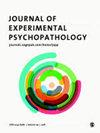Metacognition in psychosis
IF 1.9
4区 医学
Q4 PSYCHIATRY
引用次数: 3
Abstract
This Special Issue of the Journal of Experimental Psychopathology is designed to provide an overview of metacognition in psychosis. While the term metacognition has been used extensively in the psychological literature since it was formally defined by Flavell in 1979, the application of the construct to psychotic disorders, specifically schizophrenia, has been much slower and has only recently gained significant interest (Figure 1). Reasons for the relatively slow shift of attention to metacognition are unclear; however, several developments likely support the increased, and now sustained, focus on this topic. First, the definition of metacognition, and how it may conceptually relate to schizophrenia, has recently been clarified. Instead of presenting metacognition as “thinking about thinking,” which could be assumed to be a singular construct that is either intact or impaired in schizophrenia, it is now acknowledged as an overarching term that includes a spectrum of processes spanning discrete to more integrated activities. At the discrete end of the continuum are activities consistent with self-assessment such as immediate awareness of the accuracy of one’s judgments (i.e., introspective accuracy (IA)). Knowledge of cognitive processes, and the biases that may be present within them, is also included along this continuum as well as the ability to regulate or improve these processes. And, as Lysaker and colleagues argue (this issue), metacognition also includes more complex and integrated processes that allow individuals to combine multiple pieces of information into an idea or representation about the self. For example, multiple episodes of forgetting important information may lead to the idea that one has a poor memory. Recent formulations of social processes, such as the Research Domain Criteria (RDoC) framework of the National Institute of Mental Health, have also helped to refine the conceptualization of metacognition and separate it from related constructs like mentalizing or Theory of Mind. Specifically, the RDoC matrix parses the perception and understanding of the self (e.g., self-knowledge) from perception and understanding of others (e.g., understanding mental states). Thus, metacognitive processes like IA or metacognitive regulation can be distinguished from related constructs in that they are primarily self-focused. Metacognition therefore represents a distinct domain, and as demonstrated by the articles included in this Special Issue, the spectrum view provides numerous avenues for metacognitive research to improve our understanding of psychosis and to help promote functional recovery. Second, multiple strategies and measures are now available to assess metacognition. To address the more discrete activities, such as IA, participant reports of ability can be compared to objective task performance (e.g., Koren, Seidman, Goldsmith, & Harvey, 2006; Pinkham, Klein, Hardaway, Kemp, & Harvey, 2018) or to reports of knowledgeable informants (Gould et al., 2015). Sophisticated methods that utilize the signal detection framework to control for bias are also now available (e.g., Davies et al., 2018), and advanced statistical techniques offer improved methods for assessing both accuracy and bias (Pinkham et al., this issue). The integrated aspects精神病中的元认知
本期《实验精神病理学杂志》特刊旨在概述精神病中的元认知。自1979年Flavell正式定义元认知以来,元认知一词在心理学文献中被广泛使用,但将其应用于精神疾病,特别是精神分裂症,则要慢得多,直到最近才引起人们的极大兴趣(图1)。人们对元认知的关注相对缓慢的原因尚不清楚;然而,一些事态发展可能支持对这一主题的日益关注,并且现在持续关注。首先,元认知的定义,以及它在概念上与精神分裂症的关系,最近得到了澄清。元认知不再被认为是“关于思考的思考”,它可能被认为是一个单一的结构,在精神分裂症中要么是完整的,要么是受损的,它现在被认为是一个包罗万象的术语,包括一系列跨越离散到更综合的活动的过程。在连续体的离散端是与自我评估相一致的活动,例如立即意识到自己判断的准确性(即内省准确性(IA))。认知过程的知识,以及可能在其中出现的偏见,也包括在这个连续体中,以及调节或改善这些过程的能力。而且,正如Lysaker和他的同事所争论的那样,元认知还包括更复杂和综合的过程,它允许个人将多个信息片段组合成一个关于自我的想法或表象。例如,多次忘记重要信息可能会导致人们认为自己记忆力差。社会过程的最新表述,如国家心理健康研究所的研究领域标准(RDoC)框架,也有助于完善元认知的概念化,并将其与心理化或心理理论等相关结构区分开来。具体来说,RDoC矩阵通过对他人的感知和理解(如对心理状态的理解)来解析对自我的感知和理解(如对自我的认识)。因此,像IA或元认知调节这样的元认知过程可以与相关构念区分开来,因为它们主要是自我关注的。因此,元认知代表了一个独特的领域,正如本期特刊中所包含的文章所证明的那样,谱视图为元认知研究提供了许多途径,以提高我们对精神病的理解,并有助于促进功能恢复。其次,现在有多种策略和措施可用于评估元认知。为了解决更离散的活动,如IA,可以将参与者的能力报告与客观任务绩效进行比较(例如,Koren, Seidman, Goldsmith, & Harvey, 2006;Pinkham, Klein, Hardaway, Kemp, & Harvey, 2018)或知识渊博的线人的报告(Gould et al., 2015)。现在也可以使用利用信号检测框架来控制偏差的复杂方法(例如,Davies等人,2018),先进的统计技术为评估准确性和偏差提供了改进的方法(Pinkham等人,本期)。集成的方面
本文章由计算机程序翻译,如有差异,请以英文原文为准。
求助全文
约1分钟内获得全文
求助全文
来源期刊

Journal of Experimental Psychopathology
Medicine-Psychiatry and Mental Health
CiteScore
2.00
自引率
0.00%
发文量
19
审稿时长
11 weeks
期刊介绍:
The Journal of Experimental Psychopathology (EPP) is an open access, peer reviewed, journal focused on publishing cutting-edge original contributions to scientific knowledge in the general area of psychopathology. Although there will be an emphasis on publishing research which has adopted an experimental approach to describing and understanding psychopathology, the journal will also welcome submissions that make significant contributions to knowledge using other empirical methods such as correlational designs, meta-analyses, epidemiological and prospective approaches, and single-case experiments.
 求助内容:
求助内容: 应助结果提醒方式:
应助结果提醒方式:


